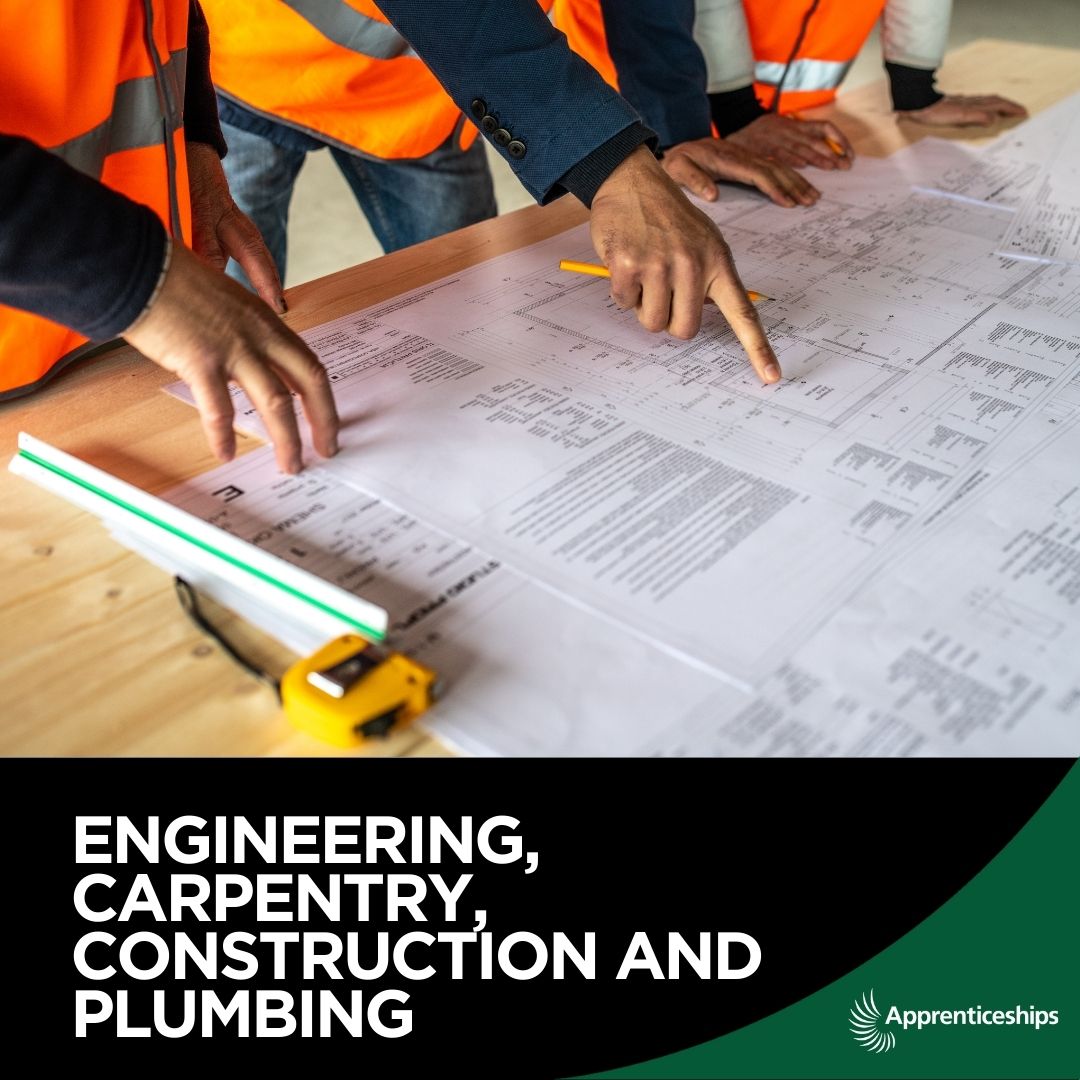apprenticeships
Choosing an apprenticeship is the smartest way to kickstart your career while still learning. It offers you hands-on experience, allowing you to work alongside industry professionals and gain valuable skills that will set you apart in the job market. With an apprenticeship, you can earn while you learn, eliminating the need for student loans and giving you real income from the start. Many apprenticeships lead to full-time job offers, providing a direct path to career security. You’ll also develop essential skills like communication, problem-solving, and teamwork, all while receiving personalised education with mentorship from experts. Take control of your future and open the door to endless career possibilities by choosing an apprenticeship today!
If you believe an apprenticeship is the right path for you, you can apply below to one of our Apprenticeships to build a career in the following courses:
How to Apply
If you believe an apprenticeship is the right path for you, you can apply directly to one of our apprenticeship courses below, giving you an opportunity to be added to our pool of talented work-ready apprentices. You can also view our live apprenticeship vacancy by clicking here.
Alternatively, you can email apprenticeships@croydon.ac.uk or call us on 0208 760 5807.
Contact Us
For advice and more information about apprenticeships and how we can help you, email apprenticeships@croydon.ac.uk or call us on 0208 760 5807



Engineering, Carpentry, Construction and Plumbing
Building Service Engineering Installer L 2
APPLY NOW
Overview of the role: Installing large-scale environmental system components for heating and cooling industrial and commercial buildings.
Duration: 24 months
CLICK HERE FOR MORE INFO
Building Service Engineering Craftsperson L 3
APPLY NOW
Overview of the course: Designing, installing and servicing engineering systems used to heat large buildings like factories and hospitals.
Duration: 36 months
CLICK HERE FOR MORE INFO
Building Service Engineering Senior Technician L 4
APPLY NOW
Overview of the role: The occupation covered by this standard is Construction Site Supervisor and typical job titles can include: Assistant Site Manager, Assistant Supervisor or Construction Site Supervisor. In the case of SME construction companies the roles are likely to include Site Manager or Site Supervisor. They are associated with supervising specialist contractors and workers on construction projects and are based on construction sites with occasional time in offices.
Duration: 36 months
CLICK HERE FOR MORE INFO
Carpentry & Joinery Level 2
APPLY NOW
Overview of the course: Using timber products to create and install building components.
Duration: 24 months
CLICK HERE FOR MORE INFO
Construction Quantity Surveying L 4
APPLY NOW
Overview of the course: The occupation covered by this standard is Construction Quantity Surveying Technician. Typical job titles can include Assistant Quantity Surveyor, Assistant Construction Surveyor, Quantity Surveying Technician, Assistant Cost Engineer or Assistant Cost Analyst. Construction Quantity Surveying Technicians are associated with the monitoring and control of costs and contracts on construction projects and are based on sites or in offices.
Duration: 36 months
CLICK HERE FOR MORE INFO
Construction Site Supervisor L 4
APPLY NOW
Course overview: The occupation covered by this standard is Construction Site Supervisor and typical job titles can include: Assistant Site Manager, Assistant Supervisor or Construction Site Supervisor. In the case of SME construction companies the roles are likely to include Site Manager or Site Supervisor. They are associated with the supervision of specialist contractors and workers on construction projects and are based on construction sites with occasional time in offices.
Duration: 36 months
CLICK HERE FOR MORE INFO
Plumbing & Domestic Heating L 3
APPLY NOW
Overview of the course:
This occupation is found in the building services sector of the construction industry.
Plumbing & domestic heating technicians size and select, plan and install, service, maintain and commission plumbing and domestic heating systems.
All technicians will be required to work on typical plumbing elements such as hot and cold water systems and storage, supplies to dwellings and associated pipework, above-ground pipework, connection to below-ground, sanitary pipework, fittings and furniture. Appliances and equipment can include central heating boilers, bathroom furniture, sanitary appliances, drainage and rainwater systems. Further to that, technicians will specialise in one of three areas:
Domestic gas-fired hot water heating appliances technician: installation and maintenance of domestic natural gas systems and central heating and hot water appliances.
Domestic air source heat pumps & solar thermal systems technician: installation and maintenance of air source heat pumps and solar thermal hot water systems in domestic premises.
Non-domestic plumbing technician: installing and maintaining plumbing systems in premises such as hospitals and healthcare premises, schools, high-rise buildings, public buildings, industrial and commercial premises, etc.
In their daily work, employees in this occupation interact with customers and end users, and as such, they require a high level of customer service. Technicians can work inside or outside customers’ properties as well as on building sites.
An employee in this occupation will be responsible for working both independently with a minimum of supervision and also as a member of a team involving close liaison and cooperation with site and line management, colleagues and other trades.
Duration: 48 months
CLICK HERE FOR MORE INFO
Property Maintenance Operative L 2
APPLY NOW
Overview of the course: This occupation is found in the construction and built environment sector, where properties across the housing, healthcare, social care, hospitality, education, commercial, leisure, retail, and private and public sectors, require maintenance to keep them in a safe working condition, and to optimise their quality or performance.
The broad purpose of the occupation is to conduct the general day-to-day maintenance required to keep a range of properties in a good state of repair. Property maintenance operatives conduct routine maintenance tasks, and minor planned and responsive repair works, using a broad range of fundamental trade skills including carpentry, joinery, plumbing, plastering, brick and block work, external works and associated finishing trades including tiling, painting, and decorating. Operatives use a wide variety of hand and power tools, materials, components, fixtures and fittings, ensuring work that is carried out is compliant with health and safety requirements, and meets building safety regulations and legislation. This requires them to know and understand the key principles of buildings and their construction, the range of building services that support a buildings operation, including electrical, plumbing, plant, safety systems and equipment, the techniques, and processes to prevent damage. Operatives are also keenly aware of the limits of their own competence, and will respond appropriately to, and report faults and defects to, others as necessary. Increasingly, property maintenance operatives are required to support in the optimisation of building performance and minimisation of environmental impact; operatives now need to record and report building information digitally, and consider sustainability and environmental choices, such as the use, recycling, and disposal of materials and components, in order to achieve net-zero carbon emissions.
In their daily work, an employee in this occupation interacts with other maintenance staff, specialist trades people, landlords and property owners, and the staff that work within or the residents that occupy buildings. Property Maintenance Operatives assist in the location of the repair works to be carried out, and to obtain further information and clarification as required from the customer, using a range of information gathering and communication techniques, whilst recording and reporting information in a variety of ways, including using digital technologies. Whilst much of the time may be working inside properties, operatives will be regularly required to work outside, conducting maintenance and repairs to properties, including to external drainage, brick and blockwork, glazing, fencing and groundworks.
An employee in this occupation will be responsible for performing planned maintenance and responsive repairs to properties, maintaining a high level of quality to the works they complete, providing maximum satisfaction to customers, clients, staff or residents within those properties. Generally, operatives work alone, but receive their direction from their supervisor or manager who selects and allocates jobs relative to the skills and experience of the operative. If on arrival the job is not as originally outlined, operatives have the responsibility to recognise their own level of competence, and report back to their supervisor or manager who will make the decision to amend the works required within the competence of the operative or assign the job to a more senior colleague or specialist professional.
Duration: 24 months
CLICK HERE FOR MORE INFO
Business, Accounting and Teaching
Assistant Accountant L 3
APPLY NOW
Overview of the course: Carrying out routine financial activities and support for businesses and organisations of all types and sizes.
Duration: 15 months
CLICK HERE FOR MORE INFO
Business Administrator L 3
APPLY NOW
Overview of the course:
Business administrators have a highly transferable set of knowledge, skills and behaviours that can be applied in all sectors. This includes small and large businesses alike; from the public sector, private sector and charitable sector. The role may involve working independently or as part of a team and will involve developing, implementing, maintaining and improving administrative services. Business administrators develop key skills and behaviours to support their own progression towards management responsibilities.
The responsibilities of the role are to support and engage with different parts of the organisation and interact with internal or external customers. With a focus on adding value, the role of business administrator contributes to the efficiency of an organisation, through support of functional areas, working across teams and resolving issues as requested. The flexibility and responsiveness required allows the apprentice to develop a wide range of skills.
The business administrator is expected to deliver their responsibilities efficiently and with integrity – showing a positive attitude. The role involves demonstrating strong communication skills (both written and verbal) and adopting a proactive approach to developing skills. The business administrator is also expected to show initiative, managing priorities and own time, problem-solving skills, decision-making and the potential for people management responsibilities through mentoring or coaching others.
Duration: 18 months
CLICK HERE FOR MORE INFO
Customer Service L 2
APPLY NOW
Course overview:
The role of a customer service practitioner is to deliver high-quality products and services to the customers of their organisation. Your core responsibility will be to provide a high-quality service to customers which will be delivered from the workplace, digitally, or through going out into the customer’s locality. These may be one-off or routine contacts and include dealing with orders, payments, offering advice, guidance and support, meet-and-greet, sales, fixing problems, after care, service recovery or gaining insight through measuring customer satisfaction. You may be the first point of contact and work in any sector or organisation type.
Your actions will influence the customer experience and their satisfaction with your organisation. You will demonstrate excellent customer service skills and behaviours as well as product and/or service knowledge when delivering to your customers. You provide service in line with the organisation’s customer service standards and strategy and within appropriate regulatory requirements. Your customer interactions may cover a wide range of situations and can include; face-to-face, telephone, post, email, text and social media.
Duration: 12 months
CLICK HERE FOR MORE INFO
Customer Service Specialist L 3
APPLY NOW
Course overview:
The role of a customer service practitioner is to deliver high-quality products and services to the customers of their organisation. Your core responsibility will be to provide a high-quality service to customers which will be delivered from the workplace, digitally, or through going out into the customer’s locality. These may be one-off or routine contacts and include dealing with orders, payments, offering advice, guidance and support, meet-and-greet, sales, fixing problems, after care, service recovery or gaining insight through measuring customer satisfaction. You may be the first point of contact and work in any sector or organisation type.
Your actions will influence the customer experience and their satisfaction with your organisation. You will demonstrate excellent customer service skills and behaviours as well as product and/or service knowledge when delivering to your customers. You provide service in line with the organisation’s customer service standards and strategy and within appropriate regulatory requirements. Your customer interactions may cover a wide range of situations and can include; face-to-face, telephone, post, email, text and social media.
Duration: 15 months
CLICK HERE FOR MORE INFO
Pensions Administrator L 3
APPLY NOW
Overview of the course: The main purpose of a customer service specialist is to be a ‘professional’ for direct customer support within all sectors and organisation types. You are an advocate of Customer Service who acts as a referral point for dealing with more complex or technical customer requests, complaints, and queries. You are often an escalation point for complicated or ongoing customer problems. As an expert in your organisation’s products and/or services, you share knowledge with your wider team and colleagues. You gather and analyse data and customer information that influences change and improvements in service. Utilising both organisational and generic IT systems to carry out your role with an awareness of other digital technologies. This could be in many types of environments including contact centres, retail, webchat, service industry or any customer service point.
CLICK HERE FOR MORE INFO
Duration: 15 months
Teaching Assistant L 3
APPLY NOW
Overview of the course:
This occupation is found in primary, secondary, special schools, alternative provision, and further education institutions such as sixth forms and colleges. Teaching Assistants work across all age ranges, supporting all learners.
The broad purpose of the occupation is to support the class teacher to enhance learners’ progress and development either in groups or individually. Teaching Assistants ensure that learners understand their work, know their learning objectives, and display positive learning behaviours in order to make progress. They deliver individual and small group teaching and apply a range of strategies to support learners of different abilities under the professional direction and supervision of a qualified teacher. Teaching Assistants may support learners with special educational needs and disabilities and learners with social, emotional, and mental health vulnerabilities.
In their daily work, an employee in this occupation may interact with all learners. This includes but is not limited to high attaining, SEND, EAL, and disadvantaged learners. Teaching Assistants will also work in partnership with teachers and other professionals within the school and education system, as well as with learners’ parents or carers.
An employee in this occupation will be responsible for delivering individual and small group teaching and adapting planning under the direction of a teacher; implementing safeguarding policies and safe practice; working effectively with other education professionals; promoting positive learning behaviours; and supporting the development of a safe and stimulating learning environment. They will work within a framework of national legislation regarding safeguarding, and within the policies and procedures of their individual education organisations.
Duration: 18 months
CLICK HERE FOR MORE INFO
Early Years and Adult Care
Early Years Educator L 3
Overview of the course: Highly trained professionals who play a key role in ensuring that young children learn and develop well and are kept healthy and safe.
Duration: 18 months
CLICK HERE FOR MORE INFO
Adult Care Worker L 2
Apply Now
Overview of the course:
Adult Care Workers are the frontline staff who help adults with care and support needs to achieve their personal goals and live as independently and safely as possible, enabling them to have control and choice in their lives.
Job titles might include: Care Assistant, Care Worker, Support Worker, Personal Assistant, Relief Team Worker, Support Worker – Supported Living, Key Worker in Residential Settings, Key Worker in Domiciliary Services, Key Worker in Day Services, Home Care Support Worker, Substance Misuse Worker, Learning Disability Support Worker, Mental Health Support Worker, Mental Health Outreach Worker and Re-enablement Worker.
To work in care is to make a positive difference to someone’s life when they are faced with physical, practical, social, emotional or intellectual challenges. Adult Care Workers need to have the right values and behaviours developing competences and skills to provide high quality compassionate care and support. They are the frontline staff who help adults with care and support needs to achieve their personal goals and live as independently and safely as possible, enabling them to have control and choice in their lives which is at the heart of person centred care. Job roles are varied and determined by and relevant to the type of the service being provided and the person supported. Adult Care Workers may work in residential or nursing homes, domiciliary care, day centres, a person’s own home or some clinical healthcare settings.
Personal assistants do the same job as an Adult Care Worker and work directly for one individual usually within their own home. Working with people, feeling passionate about supporting and enabling them to live a more independent and fulfilling life is a rewarding and worthwhile job that provides excellent career opportunities.
Duration: 12-18 months
CLICK HERE FOR MORE INFO
Lead Adult Care Worker L 3
Apply Now
Course overview:
Lead Adult Care Workers are the frontline staff who help adults with care and support needs to achieve their personal goals and live as independently and safely as possible, enabling them to have control and choice in their lives. In addition, Lead Adult Care Workers have responsibility for providing supervision, frontline leadership, guidance and direction for others, or working autonomously, exercising judgement and accountability.
Typical job titles include Care Officer, Care Supervisor, Senior Care Worker, Supervising Care Worker, Senior Support Worker, Relief Team Leader, Social Work Assistant, Social Services Officer, Outreach Development Worker, Community Support Worker, Community Outreach Worker, Community Development Worker, Family Support Worker or Personal Assistant. These could all specialise in a variety of areas such as learning disability, mental health, drug and alcohol misuse, homecare, dementia and end-of-life care.
As a Lead Adult Care Worker you will make a positive difference to someone’s life when they are faced with physical, practical, social, emotional or intellectual challenges. You will be expected to exercise judgement and take appropriate action to support individuals to maintain their independence, dignity and control. By providing leadership, guidance and direction at the frontline of care delivery you will be instrumental in improving the health and wellbeing of those receiving care and support. Lead Adult Care Workers will in some circumstances have delegated responsibility for the standard of care provided and may supervise the work of other care workers. This exercising of autonomy and accountability means leading and supporting others to comply with expected standards and behaviours.
Lead Adult Care Workers may work in residential or nursing homes, domiciliary care, day centres or some clinical healthcare settings. As well as covering Lead Adult Care Workers this standard also covers Lead Personal Assistants who can work at this senior level but they may only work directly for one individual who needs support and/or care services, usually within their own home.
Duration: 18 months
CLICK HERE FOR MORE INFO
Frequently asked questions
What are the benefits of being an apprentice?
At Croydon College we have a huge selection on offer with different employers, at different levels in a range of industries including the following:
- Learn & train for a specific job
- Get paid & receive holiday leave
- Get hands-on experience
- Study for at least 20% of your working hours at Croydon College
- Complete assessments during & at the end of your apprenticeship
- Be on a career path with lots of future potential
What levels of apprenticeships do you offer?
Our Apprenticeships are available at Intermediate, Advanced and Higher (degree) levels, covering more than 170 industries and 1,500 job roles. You can start an Apprenticeship at any level depending on your existing qualifications and experience. There are no tuition fees as training costs are funded by the government and your employer.
Depending on the level, some apprenticeships may:
- require previous qualifications such as an English or maths GCSE
- require extra training in the english or maths skills needed so you’re at the right level
At the end of your apprenticeship, you’ll achieve the equivalent education level. For example, if you complete a level 3 apprenticeship, you’ll achieve the equivalent of an A level.
How will I be assessed?
During your apprenticeship, you’ll be assessed to make sure you’re achieving the knowledge, skills and behaviours needed for your chosen apprenticeship.
Apprenticeships also include an end-point assessment. It’s an assessment at the end of your apprenticeship to make sure you’re fully competent in your specific occupation.
Your end-point assessment, known as an EPA, is carried out by an independent organisation known as an end-point assessment organisation (EPAO).
It usually includes a practical demonstration of your skills as well as a discussion with an assessor that demonstrates your learning and your ability to do your chosen occupation.




